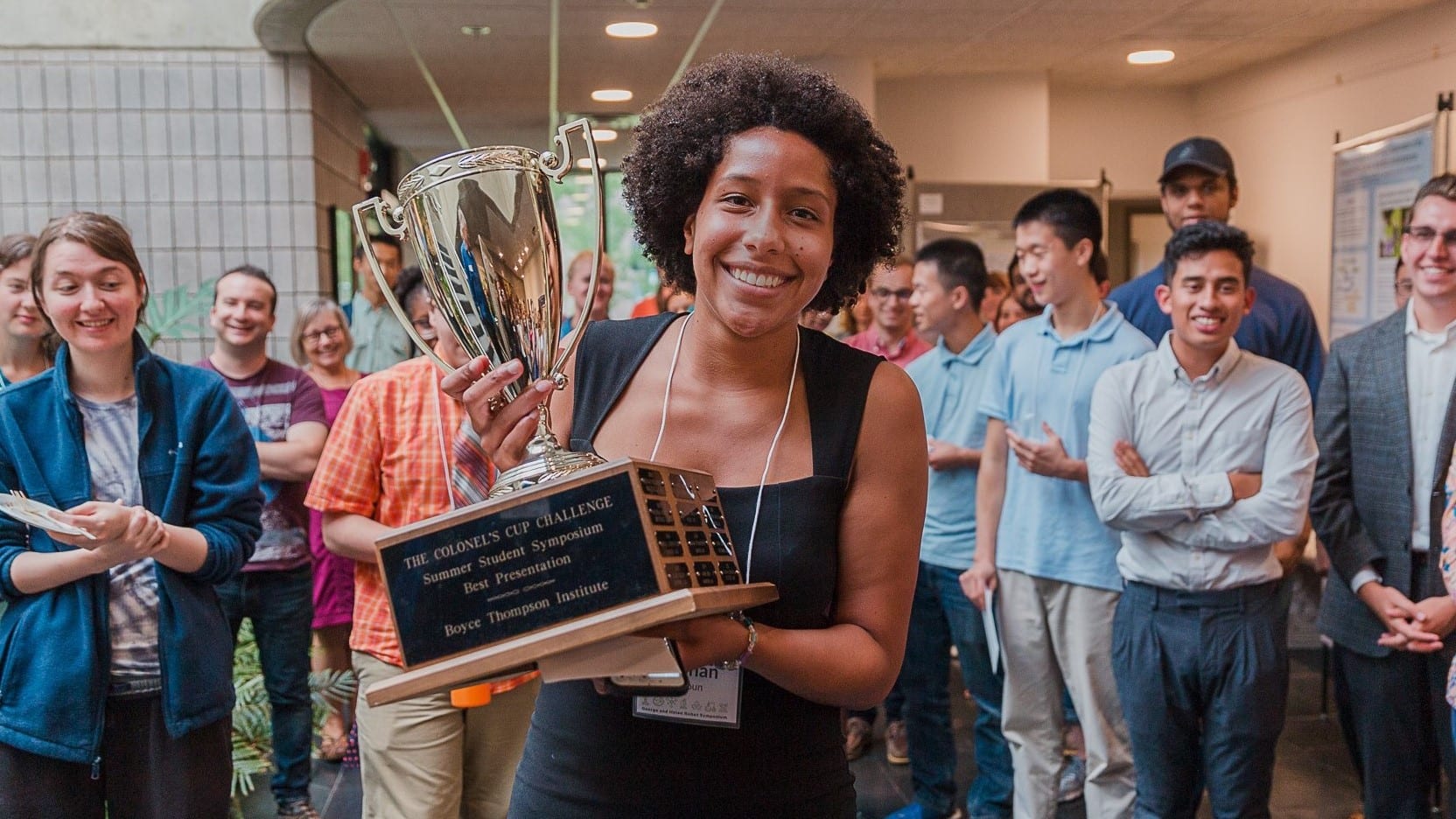News
BTI Celebrates Another Successful Summer Internship Program

BTI intern Siobhan Calhoun holds The Colonel’s Cup Challenge trophy, awarded for winning the Best Presentation at the George and Helen Kohut Symposium on August 8, 2019.
Boyce Thompson Institute celebrated its 19th annual Plant Genome Research Program (PGRP) summer internship program with an award ceremony at the George and Helen Kohut Symposium, which was held at the Institute on August 8.
The PGRP focuses on training and inspiring the next generation of scientists to help feed a growing population, while protecting the environment and enhancing human health.
As part of the program, BTI and Cornell University hosted 35 undergraduate interns for 10 weeks, and the Institute hosted eight high school interns for seven weeks.
“This summer’s internship program was one of the largest, with 43 students gaining hands-on plant research experience,” says Georg Jander, BTI faculty member and co-PI of the PGRP internship program. “I was impressed to see the quality of research and presentations from so many students.”
For the undergraduate intern awards, Siobhan Calhoun of the University of Pennsylvania won Best Presentation for a talk about her research on protein degradation in chloroplasts, and Ariel Patterson of Reed College won Best Poster for a poster about her research exploring the bacterial endophyte communities of Lycopodiaceae.
Calhoun is grateful to the BTI internship for helping her to learn about an area of biological research that was previously unfamiliar to her.
 “With the help of my mentor, I became more confident in not only my lab skills but also my writing and presentation skills, which I know will help me down the road,” Calhoun said.
“With the help of my mentor, I became more confident in not only my lab skills but also my writing and presentation skills, which I know will help me down the road,” Calhoun said.
“I was lucky enough to get the chance to experience what being a researcher is like and decide what that means for my future,” Calhoun added. “And I got to do all of this in a very lovely city, which I explored in my free time.”
Patterson said her experience at BTI helped clarify her plans to become an environmental scientist.
“Before this internship, I was on the fence about whether or not I wanted to attend graduate school,” Patterson said. “Now, I am confident in my desire to continue researching the things that inspire fascination in me as well as have the potential to help people and our environment.”
In second place were Lizzie Trost of Dickinson College for her talk on characterizing tomato lines with CRISPR/Cas9-mediated mutations in immunity-associated genes, and Jason Chobirko of the University of Pittsburgh for his poster presentation about investigating the molecular mechanisms of BAHD acyltransferase substrate specificity.
Vanesa Getseva of Ramapo College of New Jersey received third place for her poster presentation on exploring and benchmarking solutions for storing polyploids and indels on the Genomic Open-source Breeding Informatics Initiative (GOBii).
Getseva said she was grateful to work with a world-class team of biologists and software developers, and for the additional events that BTI provides its interns.
“This internship gave me the opportunity to attend numerous events and seminars that allowed me to communicate science and learn a lot about other plant biology research projects,” Getseva said. “I gained a lot of experience and valuable knowledge, improved my communication and teamwork skills, and had chance to explore the beauty of Ithaca.”
For the high school intern poster awards, Patrick Yuan of Ithaca High School won for a poster on his research characterizing the genetics of cucumber using whole genome re-sequencing, and Charles Wang of Acton-Boxborough Regional High School came in second place for a poster on his research identifying bottle gourd genes responsive to the infection of Papaya Ringspot Virus.
“We are so grateful to all of the labs and mentors who worked with these students every day over the past 10 weeks,” said Delanie Sickler, BTI’s Education and Outreach Manager who coordinates the internship program. “The passion and dedication really showed at the Symposium.”
This year’s internship program was made possible thanks to the generous support of Carolyn W. Sampson, the Ithaca Garden Club, the Legacy Foundation of Tompkins County, Rheonix Inc., Cargill Deicing Technology, the National Science Foundation’s Research Experiences for Undergraduates (REU) Program, and the United States Department of Agriculture.

